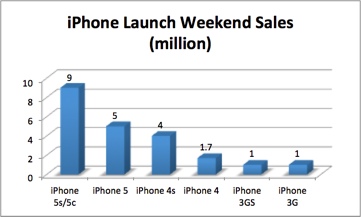iPhone 5s, 5c, iOS 7 launch weekend: How does it compare to previous launches?

According to Apple, people furiously buying new handsets and upgrading their devices over the weekend, with over 9 million new iPhones sold. This, plus all the upgrading that's been going on means that some 20 million iDevices are running Apple's new iOS 7.
Historically, this weekend has been amazing for Apple in terms of sales of new devices, beating all previous weekends and almost doubling the number of iPhone 5 handsets sold over the first weekend, where we saw some 5 million handsets sold.

The sales figures for the new devices is close to exponential, and the sales surge does not seem to have been hampered by the lack of a pre-order for the flagship iPhone 5s. People, it seems, don't mind queuing for iPhones.
This launch weekend also represents the strongest adoption rate of any version of iOS. When iOS 6 launched back this time last year some 100 million devices had been upgraded by this point. For iOS 5, the figure for the similar time period was only 25 million devices.
This will undoubtedly give developers a good feeling about the new platform. And happy developers mean more apps being written that will target the new features bought in with iOS 7.
Featured
We can put this figure into different context by looking at it in terms of iOS device sales. It took Apple eight quarters – two years – before it had sold 20 million iPhones following its release in June of 2007, and it too four quarters – a year – before it sold 20 million iPads following its release in April 2010.
While 9 million iPhones sold is headline-grabbing, I think that the 200 million devices running iOS7 is far more important, and goes to show the power that Apple commands.
In many ways this is to be expected, since there are far more than 140 million additional iOS devices in circulation now than there was a year ago, but such interest in a iOS release — which, let's face it, is now a yearly occurrence — should be comforting to Apple and a warning to the competition that there's little indication that the iOS and iPhone frenzy dying down.
iPhone fatigue? What iPhone fatigue?